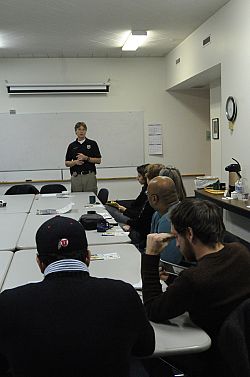Human trafficking occurs in Salt Lake, detective says

SALT LAKE CITY — Human trafficking, "a form of modern-day slavery," is the second largest crime in the United States, with illegal profits in the billions of dollars, said Detective Rob Woodbury of the Salt Lake City Police Department in a presentation on the topic to the Diocese of Salt Lake City’s Peace and Justice Commission on Nov. 17. Woodbury is assigned to Utah’s human trafficking task force, which includes members of various law enforcement agencies, including the FBI, ICE and U.S. attorney’s office. Human trafficking, legally defined as forced labor or forced commercial sex acts, occurs here in Utah. The case of the Thai workers who labored in agricultural areas in Milford and Juab County made international news last year, but other cases are less prominent, if no less disturbing. One woman in Salt Lake City was forced to cook and clean for a family that prevented her from having any contact with anyone outside the home, Woodbury said, although she was allowed to attend Mass at the Cathedral of the Madeleine with the family. Eventually, she met someone from her native country in the church’s bathroom and was able to talk with that person, which eventually helped her to get free this spring. However, "human trafficking is not just with foreign nationals," Woodbury said, adding that a typical prostitution case involving a pimp falls under the legal definition of human trafficking. Jean Hill, director of the Peace and Justice Commission, said she asked Woodbury to address the group because human trafficking is occurring in Utah but "I don’t think people realize what’s going on and that they can actually do something about it. The ultimate goal for the whole commission is that we would get this information to our parishes." Signs that someone may be being exploited include whether someone else has possession of their legal documents such as their passport, if they are being forced to work and if they are free to socialize, freely contact friends and family and attend religious services. "What we would like is for the public just to let us know that information; let us know if you think something is out of place," Woodbury said. "From the public’s standpoint, if you’ll pay attention, be aware, let people know. If you see something suspicious, follow up on it. Look for those red flags. One of the big things to understand is that it is happening in Utah and it is involving U.S. citizens." Among the dozen or so people who attended Woodbury’s presentation was Taffy Hale, a member of Saint Vincent de Paul Parish who is not a member of the Peace and Justice Commission. She said she attended because she is interested in helping those who are victims of human trafficking. "I think we can’t just sit here in this meeting and say, ‘That was really interesting’ and leave," she said. "I want to do something. The victims have to be cared for."
© Copyright 2025 The Diocese of Salt Lake City. All rights reserved.

Stay Connected With Us